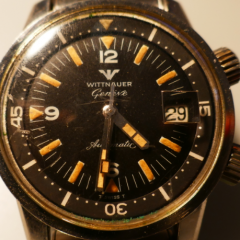-
Recently Browsing
- No registered users viewing this page.
-
Topics
-
Posts
-
By Neverenoughwatches · Posted
This set lever seems to working ok unhardened Nickelsilver, might it deform if i leave it that way ? -
By nickelsilver · Posted
I found this from a while back CS100 seems fine, but at around 500 Vickers it's not quite as hard as "blue" steel, but still harder than annealed. I'd try to find annealed (the post above has a U.K. supplier of small quantities). -
By Neverenoughwatches · Posted
As an experiment i was thinking of not hardening it to see how it fairs. Now that i have a complete template i could knock up another in half the time if this loses its elasticity. I might play about with a few pieces today to test their bending and spring properties. This was cs 100 the supplier quoted in annealed state, it was nice to work with files so I'm taking it thats its state. What you are looking seems like it would need annealing to work it. This is why i went for this stuff that cuts out that process, it was so easy to work. -
Showing state of hairspring on receipt, backplate & 'dished' wheel. Thanks, Nev. Amplitude v. weak - balance wheel turns over arc of only ~20deg. Don't know how to calculate movement rate or safely vibrate balance spring! Meantime I have reduced the 'dishing' & clock no longer runs for more than a few minutes except face down which supports my theory that it was 'dished' as a hack to avoid doing a proper repair.
-
I would harden and temper (to a light blue). It's so easy to do and only takes a couple of minutes. A search on ebay UK for "spring steel strip cs" finds plenty available in small quantites and thicknesses from 0.1mm up. But the question is ( @nickelsilver) which "CS" number is best for watch parts ? Also, from one of the ads : "CARBON SPRING STEEL. SIZE IS METRIC 15.00mm X 0.10mm X 304 MM CS100 FINISH BRIGHT . HARDENED AND TEMPERD TO 480-530VPN" I've no idea about 480-530VPN. Does that mean it needs annealing before working? Have you seen this video, he shows how to determine where the indents go ?
-






Recommended Posts
Join the conversation
You can post now and register later. If you have an account, sign in now to post with your account.
Note: Your post will require moderator approval before it will be visible.